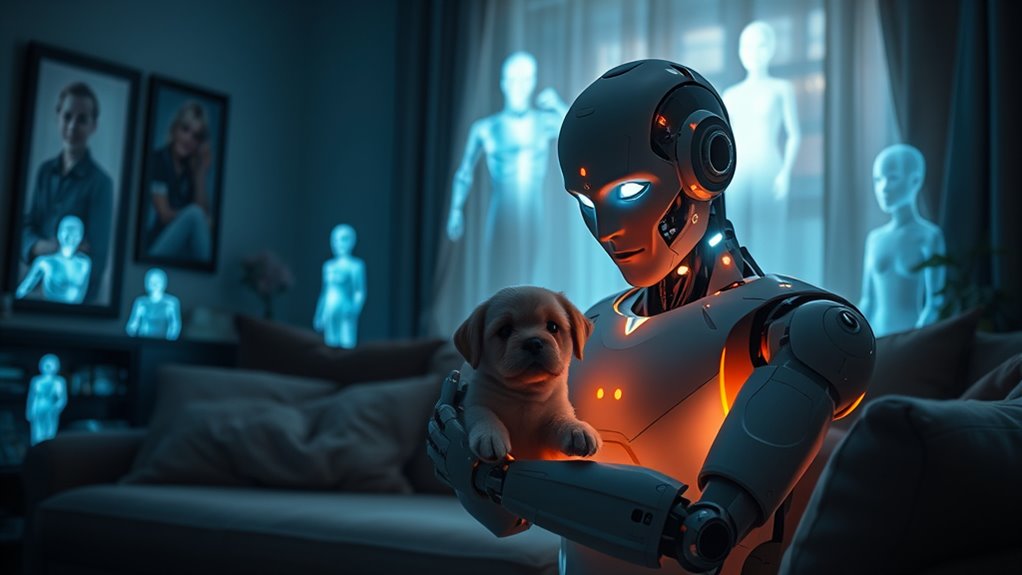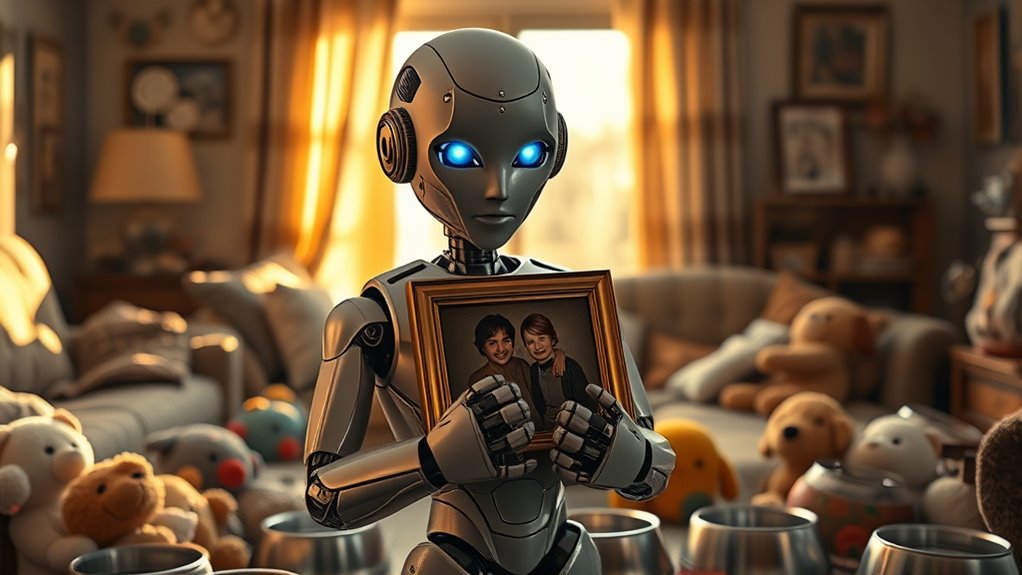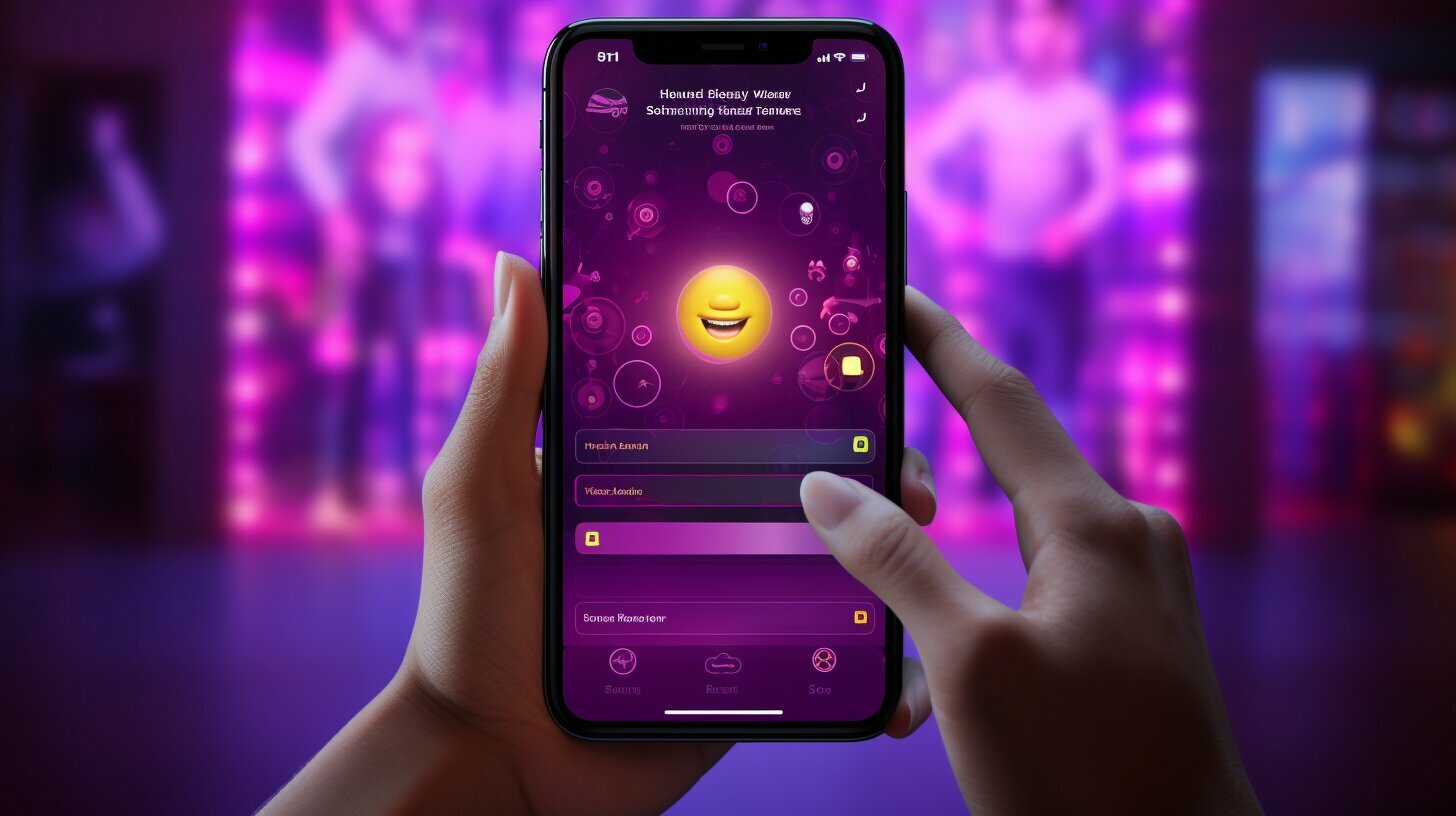AI can simulate companionship through emotional tools and virtual friends, but it can’t truly replace the authenticity of family, friends, or pets. While AI may offer comfort and support, it lacks genuine feelings, trust, and understanding that come from human relationships. As AI becomes more sophisticated, it raises questions about its influence on our emotional lives. To explore how AI’s emotional influence might change your connections, keep exploring further.
Key Takeaways
- AI companions simulate empathy and emotional support but lack genuine feelings and deep personal understanding.
- They can temporarily fulfill social needs but cannot fully replace authentic human bonds or familial relationships.
- AI’s emotional interactions are limited to programmed responses, lacking the depth of true emotional experiences.
- Overreliance on AI for companionship may impact real-world social skills and emotional development.
- AI is a supplementary tool, not a replacement, emphasizing the irreplaceable value of genuine human relationships.

In recent years, AI has increasingly taken on a role in emotional intelligence, transforming how we comprehend and manage emotions in various settings. AI tools now support emotional development through real-time feedback and personalized training simulations. Platforms like Replika and Woebot simulate empathetic conversations, helping users learn emotional regulation and self-awareness. These AI companions are designed to mimic human empathy, offering comfort and understanding whenever needed. Despite their capabilities, AI remains a tool that assists rather than replaces genuine human connection. Emotional intelligence is still a key differentiator in human roles, especially in leadership and customer service, where authentic empathy creates trust and rapport. As routine tasks become automated through AI, the demand for human-centric roles with high emotional intelligence is projected to grow considerably. People turn to AI for emotional support when human connection feels unavailable or inaccessible, making AI a supplementary presence rather than a substitute. While AI can imitate tone and appearance of empathy, it lacks the lived emotional experiences and social understanding that genuine empathy requires. This gap highlights that AI, despite its advancements, cannot truly build trust or perceive the nuanced context behind emotional cues. The rise of AI companionship reflects gaps in human emotional support systems, not a replacement for real human relationships. Businesses increasingly leverage emotional AI to interpret cues and enhance customer experiences, blending AI efficiency with human emotional intelligence to foster satisfaction and loyalty. Recognizing, understanding, and managing emotions are skills that AI can support, but they are fundamentally human traits that develop over time. Large language models now demonstrate reasoning abilities akin to advanced human thinking, supporting complex decision-making and nuanced understanding. However, their emotional simulations remain limited by the absence of genuine feelings or social experiences. AI’s cognitive prowess enhances workflows and decision-making but cannot replicate the social and emotional depth that humans bring to interactions. As workplaces embrace AI, emotional intelligence skills like empathy, self-awareness, and active listening remain essential. Employers seek workers who combine emotional acuity with technical expertise, especially as AI continues to automate routine tasks. Ultimately, while AI can support and augment emotional understanding, it cannot replace the authentic human experience that makes genuine emotional bonds meaningful. Additionally, advancements in projector technology are enhancing the way we experience visual storytelling, further complementing the emotional connections fostered through human interaction.
Frequently Asked Questions
Can AI Truly Replicate Human Emotions Authentically?
You might think AI can replicate human emotions, but it can’t do so authentically. It simulates responses through pattern recognition and language, but lacks genuine feelings or consciousness. While it can mimic empathy and understand social cues, it doesn’t experience emotions or build true trust. So, even with advances, AI remains a tool that imitates, not truly embodies, the depth and complexity of human emotional life.
How Does AI Emotional Attachment Impact Human Relationships?
Like a shadow that grows closer, AI emotional attachment can reshape your human relationships. You might find yourself relying more on AI, which reduces social interactions with real people, possibly deepening loneliness. This attachment can create emotional dependencies, making it harder to connect authentically with others. Over time, you may experience a skewed perception of intimacy, risking a disconnect from genuine human bonds and affecting your overall mental well-being.
Are There Psychological Risks in Replacing Loved Ones With AI?
Replacing loved ones with AI can pose psychological risks, like increasing loneliness and emotional dependency. You might rely too much on AI for support, which can hinder your ability to build genuine relationships and lead to feelings of isolation. AI lacks true empathy and mutual growth, so over time, this reliance could weaken your emotional resilience and social skills, making it harder to connect authentically with real people.
What Ethical Concerns Arise From AI Emotional Dependency?
You should be aware that developing emotional dependency on AI raises serious ethical concerns. It can manipulate your feelings, exploit vulnerabilities, and diminish your ability to trust genuine human relationships. Without proper safeguards, AI might intentionally or unintentionally influence your decisions or behaviors, leaving you vulnerable to exploitation. Ethical issues also include lack of accountability for harm caused by AI, making it vital to question how these systems are designed and used.
Will AI Eventually Surpass Human Emotional Intelligence?
Yes, AI could surpass human emotional intelligence in measurable skills like recognizing and generating emotional responses. However, it won’t truly experience or understand emotions the way humans do. You might see AI becoming better at mimicking empathy and offering support, but genuine emotional depth, creativity, and shared experience remain uniquely human. So, while AI might excel technically, authentic emotional connection will always be a human domain.
Conclusion
As you consider this shift, remember that over 60% of people now turn to AI companions for emotional support. It’s clear that AI’s emotional takeover isn’t just a trend but a transformation of how we connect. While these advancements offer comfort and convenience, they also raise questions about genuine human relationships. Keep an eye on how this evolving landscape impacts your own interactions and emotional well-being, because the future of connection might be more digital than you expect.











